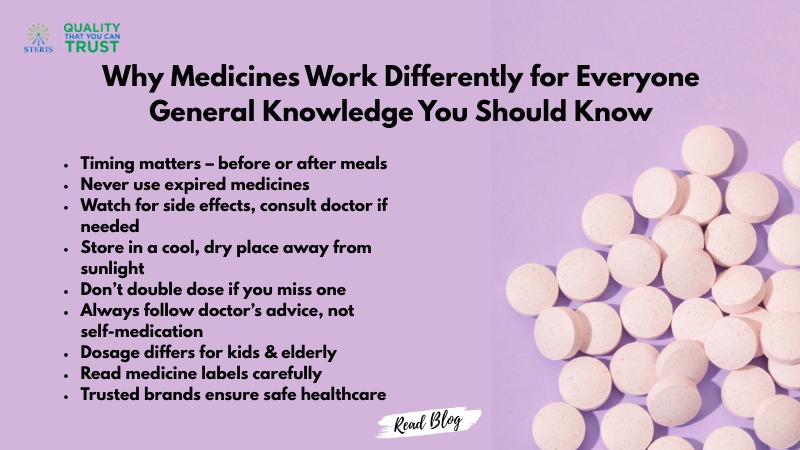Why Medicines Work Differently for Everyone: General Knowledge You Should Know
Sep 01, 2025
Medicines have become an inseparable part of our daily lives. From paracetamol for headache to long-term medicines for diabetes, hypertension, or cholesterol, most households keep a small stock of medicines at home. But have you ever wondered why the same medicine works quickly for one person, but slowly for another? Or why do doctors tell us to take some medicines before food and some after food?
This is because every person’s body reacts differently to medicines. Understanding some general knowledge about medicines can help us use them wisely, avoid unnecessary risks, and get the best possible results.
1. Medicines Work Differently for Each Person
Our age, gender, weight, lifestyle, and metabolism affect how a medicine works. For example:
-
A child’s body may need a very small dose compared to an adult.
-
Elderly people often process medicines more slowly, so doctors adjust doses accordingly
-
Even stress levels or lack of sleep can influence how fast a medicine works.
2. The Role of Food and Timing
Some medicines should be taken on an empty stomach because food slows down their absorption. Others must be taken with meals to reduce side effects. For example:
-
Metformin (for diabetes) → Best after food, to avoid stomach upset.
-
Certain antibiotics → More effective on an empty stomach.
That’s why following the doctor’s instructions is extremely important.
3. Not All Painkillers Are the Same
People often assume that all painkillers are alike, but that’s not true.
-
Paracetamol → Works best for fever, cold, and mild pain.
-
Ibuprofen → Useful for swelling, toothache, or injury-related pain.
-
Stronger painkillers → Only for severe pain and should never be misused.
Using the wrong type of painkiller may not solve the problem and can even cause side effects.
4. Why Doctors’ Prescriptions Matter
Doctors don’t just prescribe randomly. They consider your medical history, allergies, lifestyle, and other medicines you may already be taking. That’s why self-medication (taking medicine without consulting a doctor) can be risky. A tablet that suits one person may cause side effects in another.
5. Side Effects Are Not Always Dangerous
Hearing the word “side effects” often scares people. But not all side effects are harmful. Many are temporary and disappear as your body adjusts. For example:
-
Metformin can cause mild stomach upset in the beginning, but the body usually adapts in a few days.
-
Some antibiotics may cause slight dizziness or nausea, but this often goes away.
The key is to observe your body and talk to your doctor if the effects don’t improve.
6. Storage and Expiry Matter
The way we store medicines impacts their effectiveness. Heat, moisture, or direct sunlight can reduce their power. Always store medicines in a cool, dry place and avoid keeping them in the bathroom. Also, expired medicines may lose their strength or, in some cases, become harmful.
7. Lifestyle and Medicines Go Hand-in-Hand
Medicines are not magic solutions. For conditions like diabetes, high blood pressure, thyroid, or heart disease, lifestyle changes play a big role.
-
Eating healthy food,
-
Exercising regularly,
-
Managing stress,
-
Sleeping well…
…all help medicines work more effectively and may even reduce the need for higher doses.
8. Myths About Medicines
-
“If one tablet works, two will work better.” → Wrong! Overdosing can be dangerous.
-
“Herbal medicines are always safe.” → Not true. Even herbal or ayurvedic medicines can have side effects or interactions.
-
“I can stop taking medicine once I feel better.” → Dangerous chronic diseases. Stopping suddenly can worsen the condition.
Final Thought
Medicines are life-saving, but they should be taken with awareness, responsibility, and care. By understanding how they work, why prescriptions matter, and how lifestyle supports recovery, we can make the best use of them without unnecessary risks.
At Steris Healthcare, we are committed not just to providing affordable and high-quality medicines but also to spreading awareness about safe medicine use. Whether it’s medicines for diabetes, heart health, or skin care, our goal is to make healthcare accessible to every family.
Explore more trusted products and categories at: Sterisonline.com
Recent Post

rosuvastatin ezetimibe tablet : uses, benefits, dosage, side effects

How Citicoline and Piracetam Work Together for Brain Power

How to Apply Clindamycin Nicotinamide Gel Correctly

Best Keratin and Biotin Shampoo for Men & Women | DANDROPHYTE

How Ferric Pyrophosphate Syrup Boosts Hemoglobin Faster Than Regular Iron

Tedizolid Phosphate 200 mg: A Potent Option for Resistant Skin Infections

How Misoprostol 200 mcg Tablets Help Prevent Ulcers and Control Bleeding

How Erdosteine 300 mg Capsules Help Clear Phlegm and Improve Breathing

Why Rabeprazole + Cinitapride is the Best Combo for Indigestion and Heartburn

strawberry face wash : uses,benefits and more

